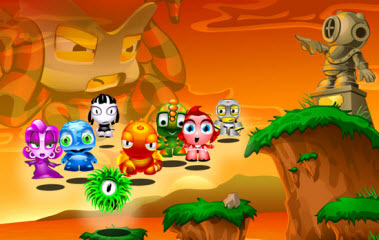 The old guard casual game companies continue to march into the brave new world of video games. Today, Oberon Media, an established casual game maker with 500 employees, is announcing that it has made a big move into the micro transaction-based video game market.
The old guard casual game companies continue to march into the brave new world of video games. Today, Oberon Media, an established casual game maker with 500 employees, is announcing that it has made a big move into the micro transaction-based video game market.
New York-based Oberon develops and publishes games for casual web sites and most game platforms. It’s also a major maker of mobile phone games. But the company’s I-play division has launched Bubble Town: Party Planet for Facebook. The game is free to play, but gamers can use real money to buy virtual goods in small transactions.
The game is the first one where Oberon is experimenting with virtual goods. The company normally focuses on more traditional business models, such as try-before-you-buy, where gamers can sample a game for an hour and then pay to play the full version. But now micro-transactions will be a big part of the push going forward.
Oberon is trailing the pack in some ways as upheaval hits casual games, where Facebook, virtual goods and the iPhone are shaking up the old order. Zynga has staked out a leading position on Facebook with more than 66 million monthly active users. Asian companies and Western companies such as Gameforge and Bigpoint have long since adopted virtual goods models.
But Tomer Ben-Kiki, chief executive of Oberon, said in an interview that it pays to be cautious. The company was founded in 2003 and so it was late to develop the first generation of casual games. But it persevered. It succeeded in becoming a big white label game maker, where its games are syndicated across 150 different sites. It bought I-Play in 2007 and became a major player in games for traditional mobile phones.
Now the market is changing again, but Ben-Kiki says a diversified game portfolio still makes sense. He doesn’t want to invest too early in some game platforms, where the profits can be small and the field crowded. If Facebook changes its platform rules, for instance, that could have a major impact on revenues for companies that are dependent upon Facebook for their livelihoods.
“We want the platforms to be mature enough,” Ben-Kiki said. “Once we roll out the business model, we will use it across a lot of platforms where our games are. I see virtual goods as a very important addition. But it is not causing an earthquake in the casual space.”
Virtual goods as a business model has come into its own in North America in 2009. About 12 percent of gamers in the U.S. say they have bought a virtual good in the past year. But Ben-Kiki said he didn’t want to be dependent on virtual goods entirely, and he said the try-before-you-buy model is still generating a ton of revenue.
Bubble Town: Party Planet is an upgrade to Bubble Towna Facebook, a Facebook app that has been played more than 120 million times. The online version of Bubble Towna is the most played game on Microsoft’s MSN Games portal. With the new game, I-Play has launched BubbleBucks, a virtual currency that lets players make purchases inside the game. They can get power ups, bonus packs, gifts, and other digital goods. Players can earn currency in the game as they complete tasks or buy currency with real money online.
The beta test site is here. Oberon is private and is backed by Goldman Sachs, Morgan Stanley and Oak Investment Partners.



